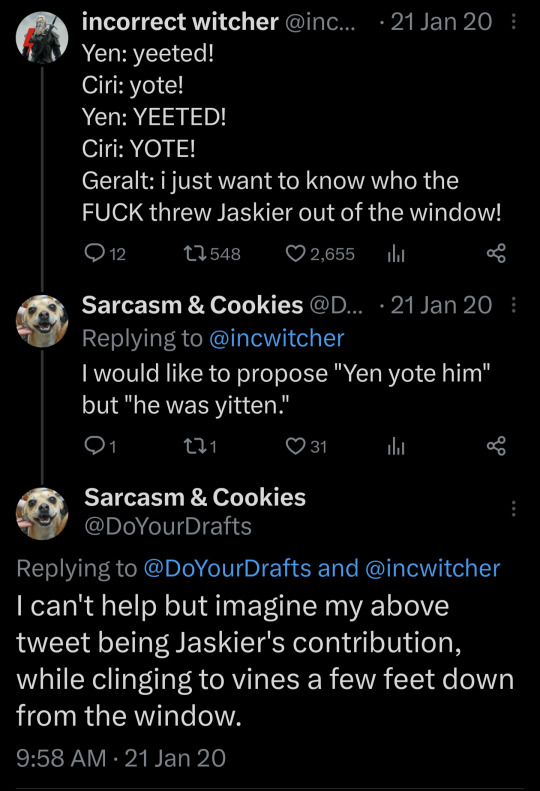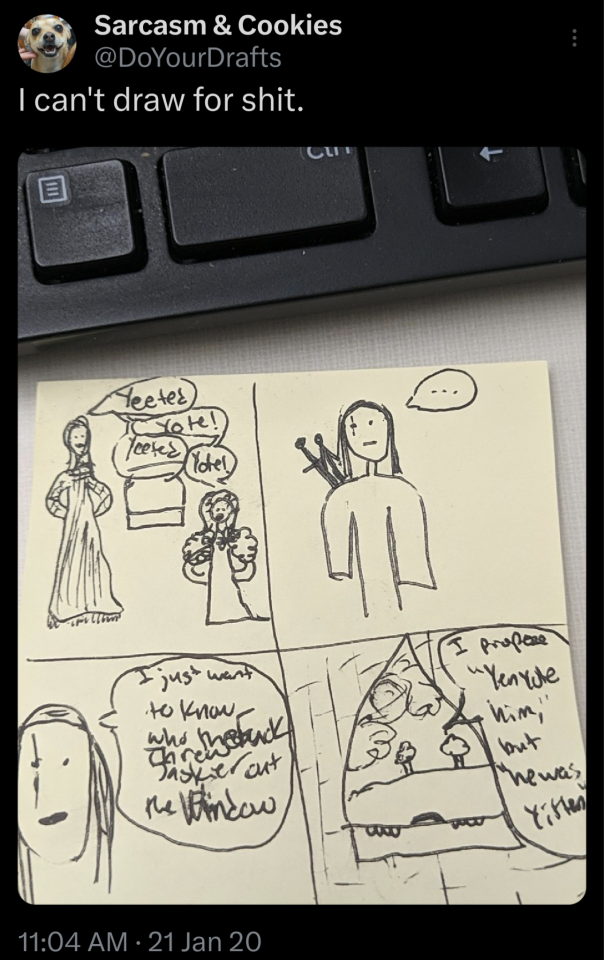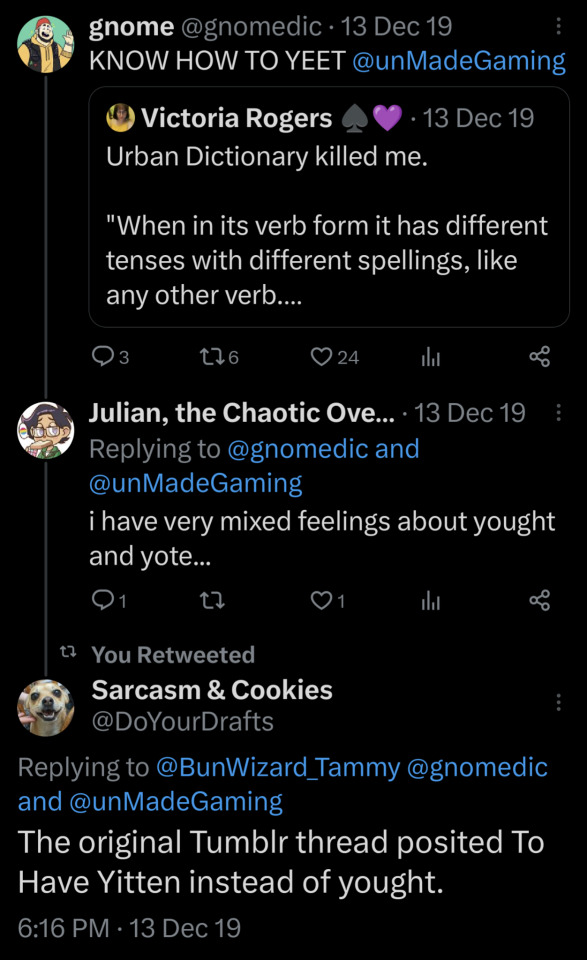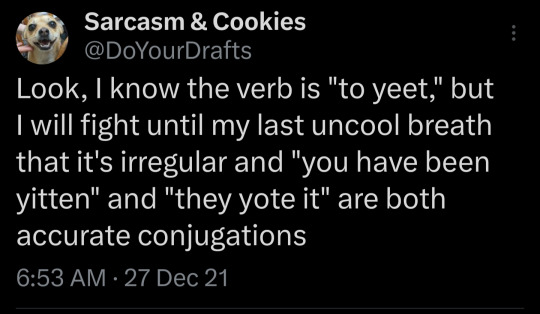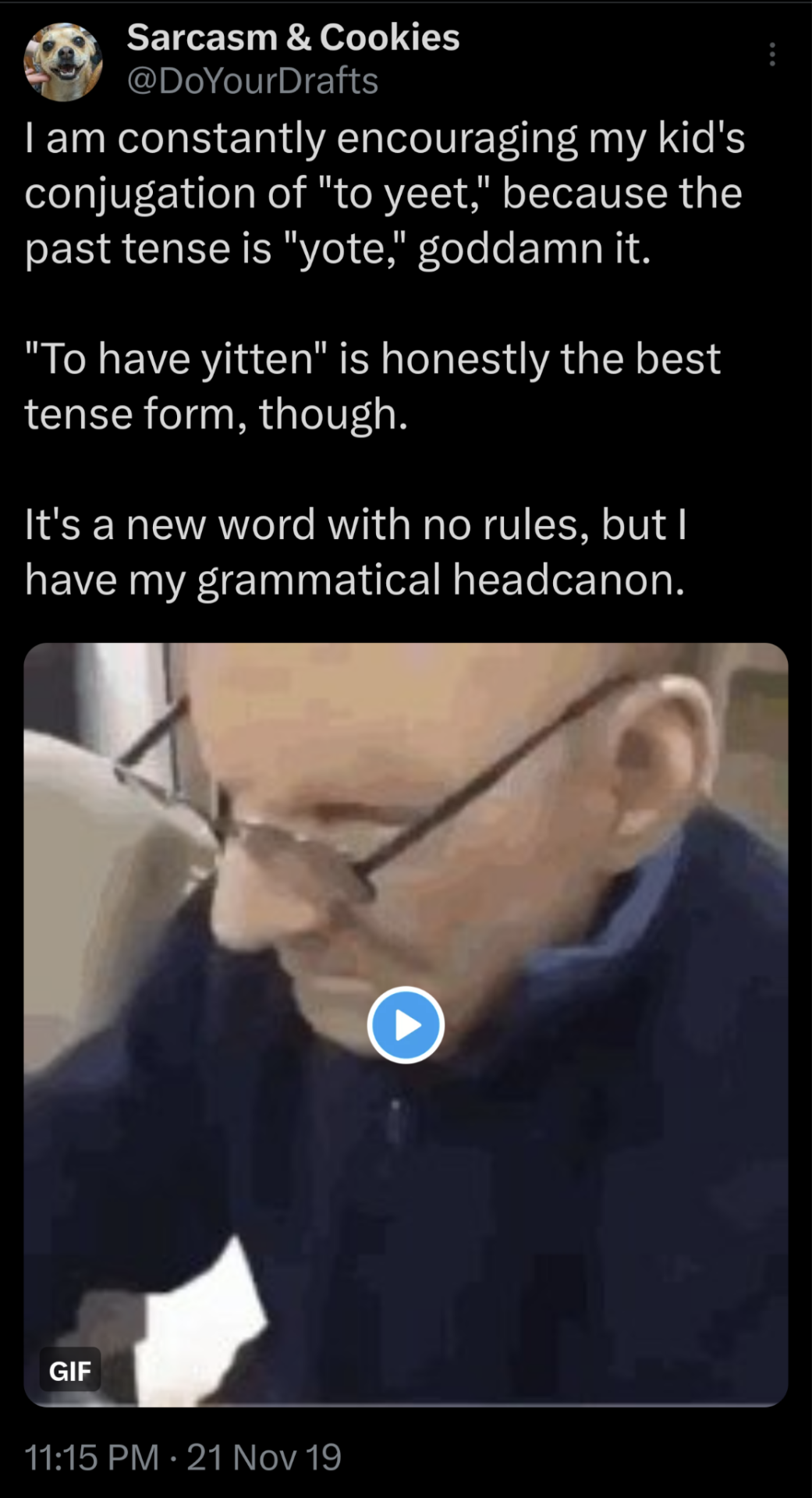#past participle
Text

"broke"
Image: shards of clay pot on ground, with two still falling to the ground.
#verbs#broke#break#broken#motion#past participle#aac symbol#aac image#communication symbol#communication image#aac emoji#custom emoji#actions
24 notes
·
View notes
Text
i've been dying for a poll option ever since i saw my followers' answers to that text post from february 2022 asking people whether they pronounce beloved as "be-lov-ed" or "be-loved". many people were emphatic about only using one option, and many others use both but were not always able to articulate when they use 2 syllables vs. 3. so out of the goodness of my heart and my insatiable lust for knowledge i have gone through the notes on that post and written down some likely contenders! you're welcome!!!!
BEFORE YOU ANSWER! think about how you would pronounce beloved in the following syntactic contexts:
noun, talking directly to the beloved: hey there beloved
noun, talking about rather than to the beloved: my beloved lives in a pineapple under the sea
adjective in a noun phrase: my beloved x lives in a pineapple under the sea
verb participle: x is beloved by y
okay poll time! there are no wrong answers!! and apologies in advance if i didn't capture your truth, i only had 10 options and life is a rich tapestry!!
#oh man i could have easily come up with another 5-8 options but they cap you at 10. which is probably a good thing#one person said they say 'my be-lov-ed x' but 'my much be-loved x'. the only difference being the 'much'. couldn't fit that one on here#someone else said they use 3 syllables in a possessive noun phrase (my be-lov-ed x) but 2 if it's not possessive (the be-loved x)#one person said it depends on whether it's past or present & i wasn't exactly sure what that meant. 'x is beloved' vs. 'x was beloved'?#i also think there's likely a distinction for some people between 'x was beloved' and 'x was beloved by y' but couldn't get into that#oh and then there's 'beloved by' vs. 'beloved of'#and since some of these are syntactic distinctions and some are semantic or otherwise i'm sure there's a whole matrix of combinations#like '3-syll noun if it's a person but 2 if it's a thing. 2-syll adjective/verb participle for both people and things'#that was beyond the scope of this poll lol#but mostly why i'm so curious is because people will very emphatically say something that might not mean what they think it means#like for instance i got the impression that at least some of the people saying 'be-lov-ed when i'm talking to them‚ be-loved when i'm#talking about them' actually mean they use be-lov-ed as a noun and be-loved otherwise#and some of the people saying 'always 2 syllables' probably have exceptions that they weren't thinking of at the moment#in particular 'dearly beloved'#and i'm very curious to know if 3-syllable people still use 3 syllables in the construction 'he was beloved by all'#so i think people's answers might change when given a list of more detailed options#fun with pronunciation#prosody#my posts#also i stressed for so long about what to call beloved in the 'x is beloved by y' construction#but settled on verb participle because i think it's fairly descriptive and accurate#so hopefully that's not too confusing? like it is a verb participle but for a verb that doesn't exist anymore (other than the participle)?#and even in 'my beloved x' beloved is a verb participle being used as an adjective if you're thinking more etymologically#but a lot of people were distinguishing 'be-loved as a verb' from other forms and i assume what they meant by that was 'x is beloved'
362 notes
·
View notes
Text
route 70 blues
When I was little, Dad taught us how the highways go: evens from east to west and odds from north to south. Starting up in Boston there's Route 90, all the way to Seattle. And then the 5 from the border at Blaine, through Seattle and down to the border at Chula Vista. Route 80 from New York, Route 70 from Maryland. And so on and so forth.
Route 70 was my favorite. There's an exit in Breezewood, Pennsylvania, and it looks like every exit on the east coast, but it was special to me because it had a McDonalds that Dad was always willing to stop at. Those were the days that you’d get the little slip that would tell you how much to pay based on which exit you were taking and there was a toll booth at Breezewood. I used to get a kick out of telling Dad how much he owed. Dean would never let me put one of those EZ-passes on Baby’s windshield, and now I just keep a couple $20s in the glovebox or pay the bills when they come in the mail. The car’s registered to a real address now.
We spent a lot of time on Route 70. Straight through a couple flyover states and ending in Utah. When Dean and I would play the alphabet game, we’d race to see who could spot the Zanesville, Ohio water tower first to get the Z and win it all. We would bet stupid shit on winning that game: who would have to clean Dad’s Colt next, who would have to cast iron bullets next. Who would have to make the beds at the next motel that would be home. That sort of thing.
But the main thing I remember about Route 70 was the way the sun would shine through the windows of the Impala once we’d get out of the green of the Kansas City suburbs and before we’d get into the Rockies. There was this little stretch where the fields turned tan with dead corn and wheat, and we’d stopped in a town called Burlington to sleep for the night on our way to a case in Moab.
It's a postage stamp town. There was a truck stop called Love’s and a motel named for the town, which was where we’d fueled up and then bedded down. I must’ve been about newly 16, Dean 20 and full of false-bravado. Dad was letting him go off on solo hunts more and more often by then, but he and I were together in the car at the time. I had been a steady passenger in the front seat by that point. And I remember – the sun was shining, and there were no trees to dapple it, and it hit Dean’s face just right. His freckles were finally coming back out in the May warmth and his eyes looked almost clear. He had a little grin on his face, the right side of his mouth pulled up as he nodded along to CCR’s Cosmo’s Factory cassette. Ramble Tamble was the opening track on the B-side. I always bitched about Dean’s music taste, but I didn’t mind the swamp rock so much. And I liked Ramble Tamble, because it reminded me of us. Drifting. A big long guitar solo that made Dean smile and made me think about moving from town to town.
Back then, I hated the way we lived, but I liked that the way we lived was something just Dean and I understood. Something just for us. No matter how many kids I couldn’t make friends with in school, eventually I'd get back in the car with Dean. And down the road we’d go.
In Burlington, Colorado, I knew I was in love with Dean. I knew it in that moment with the sun shining, with Dean's hands tapping on the steering wheel and John Fogerty crooning along in the background. I knew it in the way we’d share the motel bed since Dad only ever got rooms with two queens, and I knew it in the way that Dean would clean the guns next even though he’d spotted the Zanesville water tower first.
I'd wanted to lean over and kiss him. Instead, I'd said, “This is the tape with Up Around the Bend on it, right? I like this one.”
And he'd said: “Sammy, you might have some good music taste after all!” It'd made my chest bloom, and I loved him. I’d hold that inside for another decade before I said anything, and by that point, we were both doomed.
— for @wincestwednesdays "americana"
#don't @ me abt the past participle vs past tense i HATE IT#wincest wednesday#wincest#spike words#ww ficlet
66 notes
·
View notes
Text
A glimpse into the suffering of a historian who gives zero fucks about the military, but had to slog through The Gallic Commentaries again just to make sure he wasn't leaving any evidence out:

(Robert Morstein-Marx, Julius Caesar and the Roman People, p. 207)
#there's a reason why i tag this live-read as 'caesarhell'#it's a very special and infuriating state#and robert is an escaped inmate from caesarhell who spent five years metaphorically eating rats#and running from past participles so he could bring us this book#julius caesar and the roman people#jlrrt reads#caesarhell#robert morstein-marx
25 notes
·
View notes
Text
The grammatical implications of (holds you) (is held) is fascinating. I think we need to expand on our use of this and destroy the hold the auxiliary verb has on the past participle.
#Also I know no one cares but I'd have to argue is held is a last participle and not the past form bc#Clearly it's happening in the present tense and not the past. So it's really like just very fun present perfect continous on account of the#The be. You know
17 notes
·
View notes
Text
I love “we could have been us” because it is, truly, an ending. In that moment, Crowley acknowledges the possibility of them is gone, even if Azirphale were to change his mind. Their songbird has gone silent with the new dawn. There is no going back, only forward, as something else entirely. They could have been two former mid-ranking officers of Heaven and Hell, but Aziraphale the Metatron the plot someone has forced their hand. The only way out, now, is through.
#you IDIOT now I gotta go be Grand Duke of Hell#crowley probably#they could have been smitten#crowley just wants the damn downs cottage#good omens#fun with past participles
11 notes
·
View notes
Text
I think language learning apps should work under the assumption that I'm an idiot or maybe I should just wrestle with the fact that I didn't pay attention in english class
#smokey talks#idfk what a participle is. dont @ me#im just trying 2 learn how 2 speak and write a language not how to like... get good grades in class#i really would prefer if they taught me past tense and verbs and things and what the words in the sentence meant before worrying about#whether or not i can select which of these words is the past participle or whatever#like.. is that really that important? i know its important but is it MORE important than actually understanding the language itself???
2 notes
·
View notes
Text

I can't believe Kaeya was a woman all along.
(Localization team, please don't fix this one, it's too funny.)
#i can actually he's a wine lady#genshin#genshin spoilers#but to explain my sudden fit of giggles as i was playing through the event quest#'enchanté(e)' is french for 'pleased to meet you'#but it's a past participle#and bear with me through the grammar lesson it's funny with the explanation i promise#in french past participles that go with 'be' reflect the gender of its subject and whether there's only one or more#by adding an 'e' at the end if the subject is feminine or/and an 's' if the subject is plural#here as kaeya speaks it's written as 'enchantée'#which is the singular feminine form#tldr they accidentally made him a woman#it's a silly little mistake but my GOD is it fucking funny if you know french
10 notes
·
View notes
Text
ENGLISH IS A STUPID LANGUAGE I HATE CONJUGATIONS
#em dashes#the past participle of run being not 'ran' but also 'run' feels like somebody is just making fun of me
3 notes
·
View notes
Text
weird how have got seems like it should be a past form of "get" but in american english is actually equivalent to "have" in the present tense:
what have you got there? -> what do you have there?
i've got rhythm -> i have rhythm
you don't know what you've got till it's gone -> you don't know what you have till it's gone
while got by itself can be either a past form of "get" or a shortened form of have got with the "have" dropped:
i got you, babe -> i've got you -> i have you
i got you! -> what you say once you've caught a toddler you were chasing around saying "i'm gonna get you!" to
so got is a form of the verb "get", but when used as a past participle, it's a form of the verb "have". the past participle of "get" is not got but rather gotten (in american english). and got can only be used as a particle in have got; had got is generally not used (again, in american english; i know it works differently in, e.g., some uk dialects). so:
got: simple past of get, or a shortening of have got (present of have)
have got: present of have
have gotten: present perfect of get
*had got
had gotten: past perfect of get
i'm not sure entirely how this came to be, but i wonder if it's because of the get=acquire and have=possess senses; that is, once you acquire something, you now possess it, so to get something in the past is to have it in the present. but it's complicated by the fact that the have in have got is functioning as an auxiliary used to form a compound verb tense, rather than as the "have" that means "possess", even though the full phrase have got is equivalent to the "have" that means "possess".
#syntax#my posts#'got' feels like...the inverse of an auxiliary#you put an auxiliary next to a verb to specify a nuance (in tense or mood or whatever) about that verb#whereas you put an auxiliary next to 'got' & suddenly it's 'got' that's doing something to the auxiliary! uno reverse!#what's this? can it be...? i don't believe it! got is doing it! it's converting the auxiliary to a main verb!#and then even if the auxiliary is like 'hmm. don't like that' and leaves...#'got' continues to stand in for the main verb it turned the auxiliary into. all by itself!!! and in a different tense!!!!#and this is only possible because 1) the word 'have' is both an auxiliary and a regular degular verb#(not the case with all auxiliaries!)#and 2) one of the meanings of the regular degular verb 'have' semantically describes the state of the subject and object#once the subject 'gets' the object. so 'have' essentially corresponds to the future of 'get'#i'm trying to think of other verbs that have that relationship. live and die maybe?#die is the future of live and live is the past of die. if you die that means you once lived. if you have something that means you got it#but it doesn't really work because living isn't a one-time event the way acquiring is. and it's not as directly causal#maybe learn and know? if you use learn in the past tense it pretty much corresponds to know in the present tense#(though you can forget things you learned. but you can also lose things you acquired so i think that still works)#so let's say 'know' is an auxiliary. maybe with a meaning similar to 'can' but for the purposes of this thought experiment#let's say it functions like 'have' or 'be' in that the main verb is a participle rather than an infinitive#so 'i know swum' would essentially mean the same thing as 'i can swim'. i know swum = i learned to swim#but 'i know learned' would just mean 'i know'. and you could also drop the 'know' & just say 'i learned' & it would also mean 'i know'#idk idk idk! much 2 think about!!!!!
8 notes
·
View notes
Text
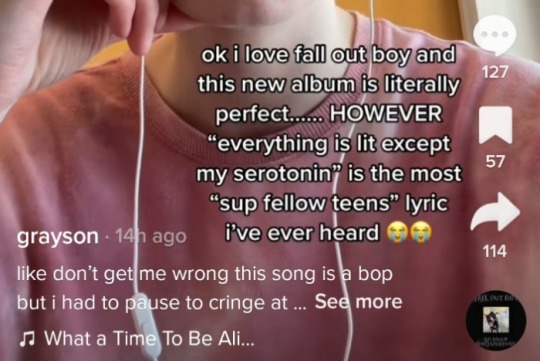
tiktokers learn media literacy challenge
#the world lit in the SAME PARAGRAPH as 'apocalypse' and 'sinking ship'#can you at least humor the idea that lit isnt just a slang. past participle of light. perhaps. when something is being lit. on fire.
8 notes
·
View notes
Text
anyone who writes in past tense please tell me what you sacrificed to the devil to give yourself that power
#I HATE IT SO MUCH WHY WOULD ANYONE EVER WILLINGLY WRITE IN PAST TENSE#are you just not allowed to use present participles anymore#that's like half of my writing gimmick#Send Help
9 notes
·
View notes
Text
j'espère que my franglais tue l'académie français like vos idées sont so putain de stupid. get franglaisé, connards
6 notes
·
View notes
Text
@ ppl who write in past tense: girl how 👁️👄👁️
#im doing it rn for a flashback scene and its hurting me . lost in the past participles soup#ppl regularly write like this?? u all live like this?????#tbf it feels way more natural to read so i understand but man . present tense my bestie forever#my post
9 notes
·
View notes
